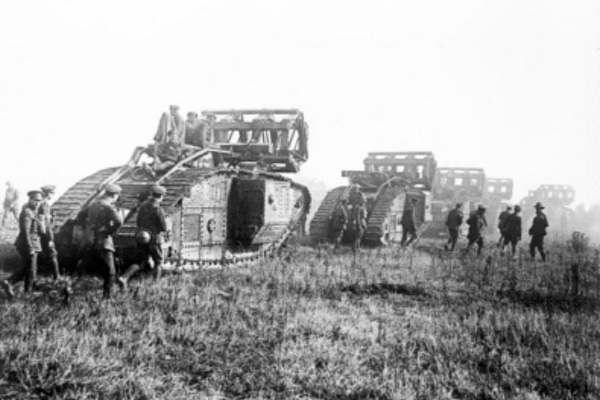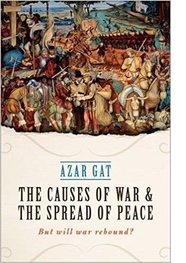The Good News We Can’t See that’s Staring Us Smack in the Face

Is the world becoming less belligerent and more peaceful? This proposition encounters widespread disbelief, as most people are very surprised by the claim that we live in the most peaceful period in history. Are we not flooded with media reports and images of conflicts around the world today, some of them very active and bloody, and others seemingly waiting to happen? Have the United States and its allies not been involved in a series of messy wars over the past few decades?
 Alternatively,
was the relative peacefulness of the post-Cold War era not
attributable to a transient American hegemony since the collapse of
the Soviet Union, to a fleeting post-Cold War moment? Are we not
tempted by a resurfacing of old illusions that will again be
dispelled by the rise of China to a superpower status, by a resurgent
Russia, or by vicious wars in south or central Asia, the Middle East,
and Africa?
Alternatively,
was the relative peacefulness of the post-Cold War era not
attributable to a transient American hegemony since the collapse of
the Soviet Union, to a fleeting post-Cold War moment? Are we not
tempted by a resurfacing of old illusions that will again be
dispelled by the rise of China to a superpower status, by a resurgent
Russia, or by vicious wars in south or central Asia, the Middle East,
and Africa?
The notion that war is declining first appeared in Europe and the West during the nineteenth-century, the most peaceful in European history up until then. But it seemed to have been brutally shattered by the two world wars. These were followed by the Cold War, a clash of titans which arguably did not turn hot and develop into a third world war only because of nuclear deterrence.
And yet, even before and increasingly after the end of the Cold War, new claims about the decline of war have been put forward. First, the Long Peace – no war between the great powers since 1945 – has passed its seventieth year, and counting. It is widely attributed to the nuclear factor. However, before the Long Peace and nuclear weapons, the 19th century, from 1815 to 1914, was already the most peaceful in European history, with wars declining to a third of their earlier prevalence.
Second, scholars have found that modern democratic/liberal societies hardly ever fight each other. Notably, though, democracies did fight each other before modernity, as in Classical Greece and Italy. Furthermore, non-democratic countries have also fought far less since 1800, as compared to their earlier record.
Third, other scholars have suggested that what we are witnessing is a capitalist peace between trading partners, rather than a democratic peace. However, it should again be noted that trading states before the nineteenth century – such as ancient Athens and Carthage, medieval Venice, and early modern Portugal, Holland and Britain – tended to monopolize trade by force, rather than embrace peaceful free trade. Something profound evidently changed from around 1800.
During the past decade, several books have been published on the decline of war, but the exact causes and timespan of the change remain obscure. In my book, The Causes of War and the Spread of Peace: But Will War Rebound ?, I show that modernization, spurred by industrialization since the beginning of the nineteenth century – the most revolutionary transformation in human history – underlies all the above-mentioned peace phenomena.
With wealth per capita increasing 30 to 50-fold in the most advanced countries since the beginning of industrialization, the Malthusian trap that had plagued premodern societies has been broken. Wealth is no longer finite, and it is growing primarily through investment at home, from which war is a distraction. Conjointly, trade has rocketed as a function of the reorientation of mass production to the market. And this change in the economic calculus also explains the altered preferences of democratic electorates.
People have always alternated between the three behavioral strategies of cooperation, peaceful competition, and violence to fulfill evolution-shaped human desires. Developments since the onset of the industrial age from 1815 onwards have radically shifted the calculus of war and peace towards the two peaceful options, sharply decreasing belligerency in the parts of the world affected by the process of modernization. Hence the Modernization Peace. Rather than war becoming more costly in terms of life and resources, as many believe to be the case (not so), the real change is that peace has become more rewarding.
By now, war – both between and within states – has disappeared in the world's most developed areas, such as Western Europe and North America. Thus, Holland and Belgium no longer fear in the slightest a German (or French) invasion, a situation entirely unprecedented in history. Similarly, Canada is not at all concerned about the prospect of conquest by the United States, though people find it difficult to explain why exactly this is so. In East Asia, the most developed countries, such as Japan, South Korea, and Taiwan, do not expect war with any of the developed countries, though they are deeply apprehensive of being attacked by less developed neighbors, such as China or North Korea.
Civil war has similarly disappeared in the developed world, not least because of the widespread acceptance in liberal countries of the right of secession if voted for by the majority of the population in question. This can be seen in Canada with respect to Quebec, in the UK in relation to Scotland, in Belgium, and, in practice if not officially, in Spain as concerns Catalonia and the Basque Country. Nobody is going to send in the troops, as in the past.
The world is sharply divided between a “zone of peace” and a “zone of war.” Both inter-state and civil war survive only in the undeveloped, less developed and developing parts of the world, among those still far behind on the road to modernization, or between them and developed countries.
None of this should lead to the conclusion that there are no clouds – and storms – on the horizon. The Modernization Peace has seen setbacks in the past, most fatally during the two world wars, when the economic and political foundations of the Modernization Peace crumbled. And challenges to the peace still arise. They include claimants to alternative modernity, such as China and Russia, both still much behind in levels of development and affluence, anti-modernists and failed modernizers. The latter may spawn terrorism, which might also be embraced in the developed countries by any individual or group with a grievance or a cause.
Terrorism's really ominous potential is in the unconventional field, most notably perhaps biological terrorism, which can be as lethal as nuclear weapons while being increasingly accessible, due to the ongoing biotechnological revolution. The dangerous development of our times is that weapons of mass destruction might trickle down to below the state level, democratizing and privatizing the ability to cause mass death, previously the monopoly of states. Scenarios reserved to fiction of the James Bond genre suddenly becomes real.
Although the world has become more peaceful than ever before, with war unprecedentedly disappearing in its most developed parts, there is still much to worry about in terms of security and there is no place for complacency.